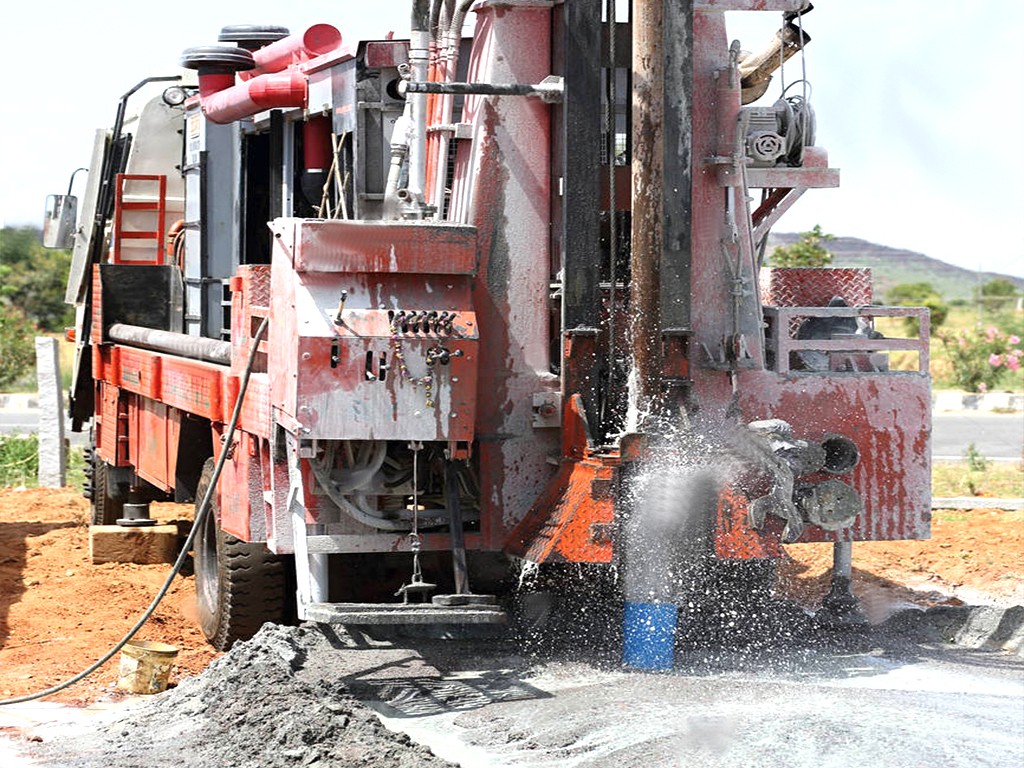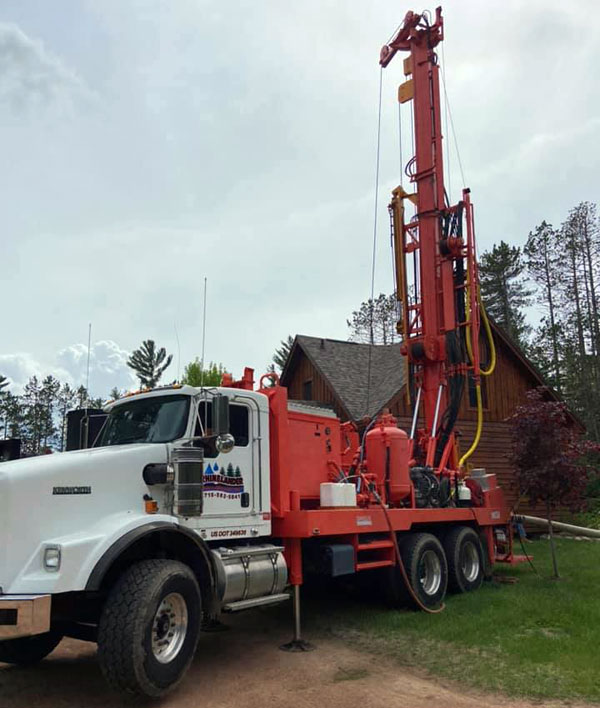Boost Your Water Quality With Effective Water Filtration Solutions for Well Drilling
Enhancing water top quality is a vital consideration for home owners relying upon well water. Contaminants in groundwater can present substantial health risks. Reliable water filtration services play a crucial function in making sure the safety and preference of well water. Comprehending the kinds of filtration systems readily available is vital. This knowledge can direct house owners in making notified decisions for their water requires. Selecting the right system calls for cautious examination of particular pollutants. What alternatives are available to improve your well water?
Recognizing Groundwater Contamination
While numerous assume groundwater is naturally risk-free, various aspects add to its contamination, presenting significant risks to health and wellness and the setting. Agricultural techniques, including pesticide and plant food usage, can seep unsafe chemicals right into the soil, at some point getting to aquifers. Industrial tasks might also release toxins, such as hefty metals and solvents, into the ground, exacerbating contamination concerns (water filtration systems Union County NC). In addition, improper garbage disposal, including septic systems and landfills, can present pathogens and harmful compounds into groundwater products
Natural occasions, such as flooding or drought, can even more impact water high quality by modifying the equilibrium of pollutants. As groundwater acts as a main drinking water source for millions, understanding these contamination sources is important. Communities should understand neighborhood threats and advocate for surveillance and safety procedures to guard their supply of water. Eventually, identifying the intricacies of groundwater contamination is essential to guaranteeing the wellness and security of both individuals and environments.
Relevance of Water Filtration for Well Water

Impurity Elimination Advantages
Reliable water filtration is vital for making certain the safety and top quality of well water, as pollutants can present major health and wellness dangers. Well water may have different pollutants, consisting of germs, heavy steels, and chemicals, which can negatively affect both health and wellness and taste. Making use of innovative filtration systems enables the efficient removal of these hazardous compounds, improving the total water top quality. The advantages of contaminant elimination include improved visual top qualities, such as clearer and better-tasting water, along with the reduction of potential carcinogen. In addition, reliable filtration systems can prolong the life-span of plumbing and home appliances by reducing sediment accumulation. To summarize, attending to impurity elimination through appropriate filtration methods is crucial for keeping safe, clean, and tasty well water.
Wellness and Security Guarantee
Guaranteeing health and wellness in well water calls for a durable filtration system, as unattended water sources can harbor countless pathogens and unsafe compounds. Contaminants such as germs, infections, heavy metals, and chemicals position significant health and wellness threats to individuals depending on well water for drinking and house usage. Reliable water filtration systems are essential for getting rid of these impurities and making sure the water is secure for intake. Regular screening and upkeep of filtration systems boost their effectiveness, consequently protecting public health and wellness. Additionally, making use of sophisticated innovations like reverse osmosis or UV treatment can better enhance water quality. To wrap up, buying reputable water filtration options not only protects specific health and wellness yet additionally fosters neighborhood well-being by advertising secure water access.
Kinds Of Water Filtration Systems
A selection of water filtration systems are offered to assure the quality of well water. Reverse osmosis systems, carbon filtration techniques, and UV water purification represent three usual techniques, each with distinctive benefits and applications. Comprehending these choices can help in choosing the most suitable system for particular requirements.
Reverse Osmosis Systems
Many houses and commercial centers depend on reverse osmosis systems as a main technique for water filtration. These systems function by pressing water with a semi-permeable membrane, successfully removing pollutants, pollutants, and liquified solids. The process is particularly beneficial for eliminating numerous toxins, including heavy steels, chlorine, and microorganisms, resulting in cleaner, much safer drinking water. Reverse osmosis systems can be installed at point-of-use locations, such as under kitchen area sinks, or as whole-house systems, satisfying various needs. The effectiveness of these systems makes them a preferred option, supplying high-quality water with marginal upkeep. Nevertheless, users ought to recognize possible water waste connected with the filtration procedure, which can vary depending on the specific system design and usage.
Carbon Filtration Techniques
How efficient are carbon filtration techniques in improving water top quality? Carbon filtration is a widely identified strategy that enhances water quality by eliminating pollutants and contaminants. These techniques primarily use triggered carbon, which has a large surface location that adsorbs hazardous materials, consisting of chlorine, unstable organic substances (VOCs), and particular heavy steels. There are various carbon filtration systems, such as granular activated carbon (GAC) filters and carbon obstruct filters, each offering distinct advantages relying on certain water high quality issues. GAC filters are generally used for taste and smell removal, while carbon block filters offer finer filtration. In general, carbon filtration techniques function as a reliable solution for individuals looking for to assure cleaner, safer alcohol consumption water from well resources, dealing with typical concerns associated with water high quality.
UV Water Purification
While lots of water filtration systems concentrate on physical and chemical elimination of impurities, UV water purification attracts attention for its ability to inactivate microbes effectively. This approach makes use of ultraviolet light to interfere with the DNA of microorganisms, infections, and protozoa, making them incapable to reproduce and cause disease. UV purification is specifically advantageous for well water, as it can deal with biological contaminants without including chemicals to the water. The system typically contains a UV lamp housed in a safety chamber where water moves. It is essential to note that while UV filtration efficiently gets rid of virus, it does not remove sediments, chemicals, or hefty steels; as a result, it is commonly used along with other filtration techniques for extensive water therapy.
Benefits of Activated Carbon Filters
Triggered carbon filters offer significant advantages for water purification, specifically in well drilling applications. These filters efficiently eliminate impurities such as chlorine, unpredictable natural compounds (VOCs), and sediment, boosting the total taste and odor of the water. By using a procedure known as adsorption, triggered carbon captures impurities, guaranteeing cleaner water for different usages.
Another vital advantage is their capacity to lower hazardous substances, such as hefty metals and pesticides, which may be existing in well water. This makes triggered carbon filters an essential component in protecting public health and wellness and ecological top quality.
In addition, the installment and upkeep of turned on carbon filters are reasonably simple and cost-efficient, giving a sensible solution for water therapy. water filtration systems Union County NC. Their convenience enables them to be integrated into existing systems effortlessly, making them a prominent option among homeowners and experts alike. On the whole, turned on carbon filters play a crucial function in enhancing water quality in well drilling contexts
The Role of Reverse Osmosis in Water Filtration
Reverse osmosis (RO) functions as an essential modern technology in the field of water purification, especially in addressing the difficulties posed by contaminants in well water. This procedure uses a semi-permeable membrane layer to separate pollutants from water, effectively eliminating liquified solids, hefty metals, and bacteria. The mechanism operates by applying stress to push water with the membrane, enabling only clean water to pass while leaving impurities behind.
RO systems are particularly helpful for families depending on well water, which can usually have harmful compounds such as nitrates, sulfates, and arsenic. By substantially improving the general top quality of alcohol consumption water, reverse osmosis systems contribute to far better health and wellness results and boosted safety and security. Their effectiveness in reducing total liquified solids makes them a preferred choice for those seeking reputable water filtration options. On the whole, RO technology plays an important role in guaranteeing risk-free and clean water access for well water users.
Choosing the Right Filtration System for Your Needs
Just how can homeowners effectively determine one of the most ideal water filtration system for their certain requirements? They need to examine the high quality of their well water through comprehensive testing, recognizing pollutants such as germs, hefty metals, and particulates. This information will lead them in picking a purification system tailored to address those details problems.
Next, home owners need to assess their house water usage and circulation rate needs, as these aspects will affect the kind and size of the filtration system. Choices consist of debris filters, turned on carbon filters, or advanced systems like reverse osmosis or UV purifiers, each offering different objectives.
Additionally, house owners ought to evaluate the setup and find more info upkeep requirements of each system, along with their budget restrictions. well drilling Union County NC. By stabilizing efficiency, effectiveness, and expense, homeowners can make informed choices, ensuring their chosen filtration system effectively boosts their water high quality for several years to come
Maintenance Tips for Your Water Filtration System
Routine upkeep is essential for ensuring the long life and performance of a water filtration system. To achieve this, regular inspections ought to be carried out to look for any kind of indicators of wear or damage. Filters need to be changed according to the producer's suggestions, as clogged up filters can lower water top quality and circulation. Additionally, cleaning the system elements, such as pre-filters and membrane layers, can protect against build-up of impurities and boost efficiency.
Surveillance water high quality regularly can also help recognize concerns early. If water preferences, scents, or appears unusual, prompt activity is essential. It is advisable to keep a log of upkeep activities, detailing filter changes and evaluations, to track the system's performance in time. Users should additionally acquaint themselves with the specific needs of their filtration version, as each system may have unique upkeep requirements. By adhering to these practices, customers can assure their water filtration system operates efficiently and properly.

Frequently Asked Questions
How Typically Should I Evaluate My Well Water High Quality?
Well water quality should be tested a minimum of annually. Additional screening might be necessary after heavy rains, flooding, or if any kind of adjustments in preference, odor, or appearance are kept in mind, ensuring safety and next page health and wellness.
Can I Mount a Purification System Myself?

What Is the Life expectancy of a Regular Water Filter?
The life-span of a common water filter varies, normally lasting between 6 months to 2 years, depending upon the type, usage, and water quality. Regular upkeep and prompt replacements are essential for peak performance.
Exist Any Kind Of Chemicals Utilized in Filtration Solutions?
Yes, various chemicals are used in filtration systems, consisting of chlorine for sanitation, coagulants to eliminate put on hold bits, and pH insurance adjusters. These chemicals help boost water top quality by successfully getting rid of pollutants and click to find out more guaranteeing safe alcohol consumption water.
Exactly How Can I Improve My Well's Water Stress?
To enhance well water stress, one may consider evaluating the pump, removing any clogs in pipes, readjusting the pressure tank, or seeking advice from a specialist to assess the system's general efficiency and capability.
Verdict
To sum up, improving water top quality with reliable filtration services is crucial for well water security. By comprehending groundwater contamination and selecting the appropriate filtration system-- such as triggered carbon filters or turn around osmosis-- home owners can assure cleaner, safer water for their households. Normal maintenance and screening of these systems additionally promote health and wellness, making it essential for those counting on well water to spend in proper filtration services for better water quality.